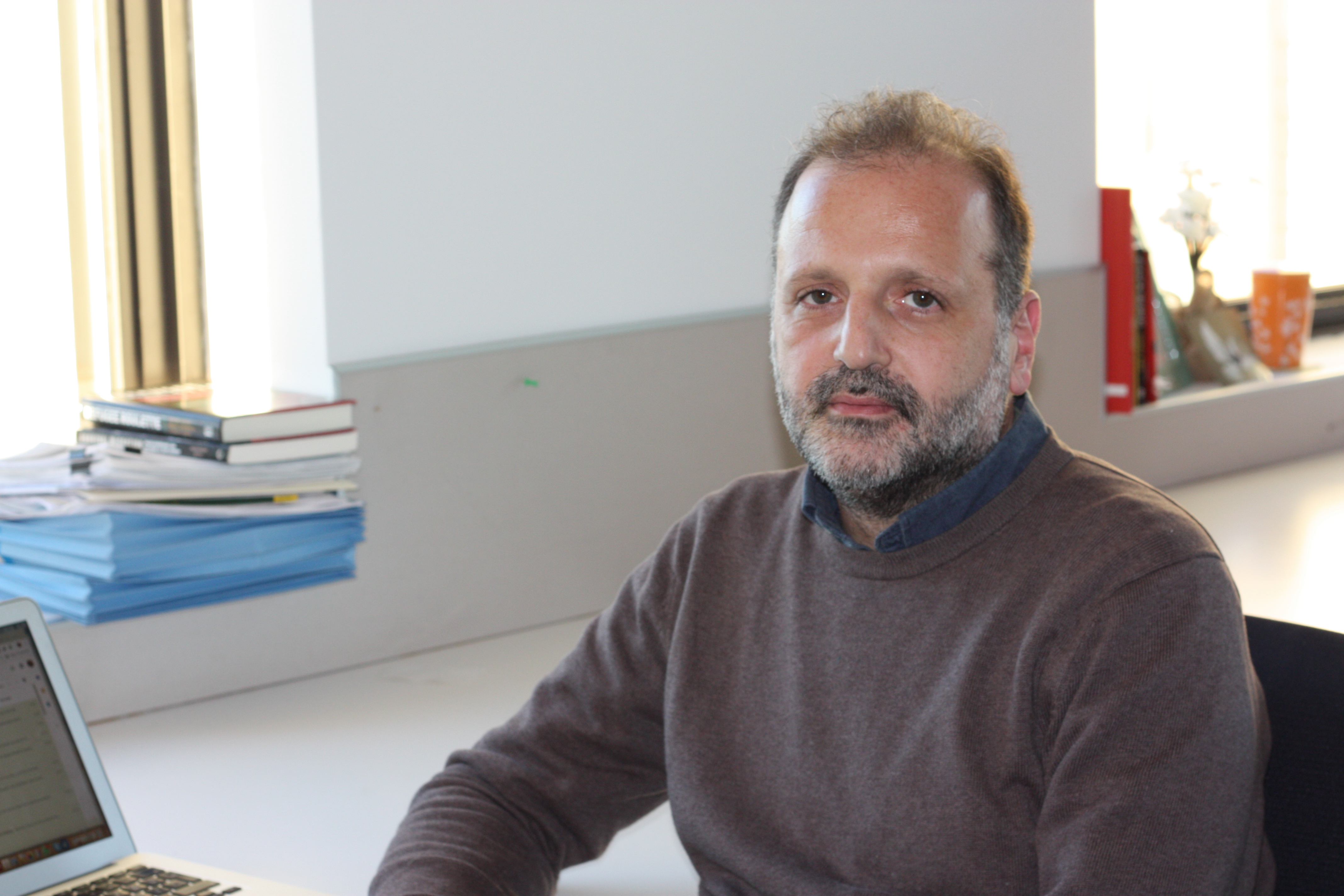In January 2016, Cem Özatalay was one of the 1,128 Turkish scholars to sign a petition urging the Turkish government to end what they called acts of violence against Kurdish people. “When I read the petition, I signed it without hesitation,” said Özatalay. “But to be honest, when I signed, I didn’t believe for even a moment that this petition would have a consequence because I had doubts about the political utility of petitions. Now I understand that I was mistaken.”
The consequence: Özatalay was blacklisted in Turkey the following year, excluding him from all academic activities except teaching. He now faces 15 months in prison and will find out his fate next month when a Turkish judge will decide if he is guilty of “spreading terrorist propaganda,” according to BBC’s reporting on four of the Turkish signatories who have been put on trial.
Özatalay, a sociology professor at Galatasaray University in Istanbul, is the first visiting scholar to come to the New School as part of a revival of the University in Exile.
The original University in Exile was established at the New School for Social Research in 1933 by the university’s first president, Alvin Johnson, as a response to the growing threat of Nazism in Europe. The New School brought more than 180 academics and their families to safety in the United States, many of whom became integral to the New School community, such as German political theorist Hannah Arendt and German economist and sociologist Emil Lederer.
This modern-day University in Exile (UIE) launched at a time when universities, scholars and students in countries around the world are under threat. Over the past five years, 41 countries have suffered “at least five attacks on education, including at least one that was intentional or deadly,” according to the Global Coalition to Protect Education from Attack.
The New School launched the initiative on Sept. 6 with a mission to lead the academic community in the United States in hosting what TNS calls “endangered scholars” from around the world.

Dr. Arien Mack, Alfred and Monette Marrow Professor of Psychology at the New School for Social Research, was the driving force behind the initiative. “Our mission is to create a community among exiled scholars who have suffered loss of position and home, as a way of trying to help them cope with their deep sense of estrangement,” she said.
There are currently 12 universities involved with the New University in Exile Consortium, including Columbia, Brown, Barnard and Georgetown University, as well as the New School.
The UIE is currently running online seminars with Richard Bernstein, a philosophy professor at NSSR, for all of the scholars hosted by the Consortium’s colleges and universities. The seminars are held weekly and focus on topics such as the reasons for fleeing their countries, the conditions of their countries, and the political and social nature of exile.
“I see that the scholars who are in New York experience more difficulties than others,” said Özatalay. “When you arrive in the United States, you have no credit score or bank account so landlords prefer not to give you an apartment. It is very difficult to set up a life here.”
Özatalay qualified for the two conditions for a scholar to be granted exile at one of the Consortium’s universities: applicants must have a valid passport and they must be living and working in his or her country under threat.
As pressure from the Turkish government was increasing, Özatalay and his wife had a son. He was born in October 2017, two months before the scholars were set to face legal scrutiny for their political positions.
His public university’s administration took away his right to a sabbatical because they adhered to the Turkish government’s accusation that he was supporting terrorism, according to Özatalay. However, unpaid parental leave is a right allocated to all public servants in Turkey that does not need to be approved by a supervisor.
His leave would allow him to move away from Turkey and keep his position at his Galatasaray University for one year.
One of Özatalay’s former undergraduate students in Turkey is currently continuing his graduate studies at NSSR and told Özatalay about the opportunity to apply for the Endangered Visiting Scholar position at the New School before the New UIE was established.
“After I was accepted by the New School,” said Özatalay, “Arien Mack wrote me an email and told me about the development of the New UIE and asked me to be a part of this initiative, which I accepted.”
Özatalay and his wife decided that moving to New York was the best opportunity for him to continue his career.
Özatalay, 45, has written book chapters and articles in French, Turkish and English. His areas of focus are on social inequalities, sociology of power, economic sociology of capitalism, neoliberalism, morality and economy, and art and economy.
In 2002, Özatalay was recruited to become a research assistant by the sociology department in Galatasaray University. In 2010, he completed his Ph.D. at the School for Advanced Studies in the Social Sciences in Paris. In 2015, he became an associate professor in sociology at Galatasaray University.
Now at the New School, Özatalay said he has the space and resources to finish his book, which focuses on Turkey’s social structure, and three research papers, which detail Turkey’s discrimination and moral conflicts in the country’s economic sphere.
He arrived in New York on Aug. 31 and spends his days in a communal workspace that overlooks the Empire State Building, pursuing his work with the Zolberg Institute, a research center part of NSSR.
In addition to funding his research studies, the New School provided Özatalay with office space. Will Milberg, dean of the NSSR, became Özatalay’s guarantor in his search for an apartment, which he was able to secure after being in New York for more than a month. Still, living in New York is not what he wants.
“Being here is not a salvation for me,” said Özatalay. “You have to leave your position, your network, your home, and move to an unknown place.”
Özatalay does not regret signing the petition that has had such an effect on his life. “In this period, hundreds of people lost their lives, their relatives, their children,” he said. “These are all unrecoverable losses. I regret only for not having been able to prevent all these tragic events in my country.”
President Recep Tayyip Erdoğan, elected in 2014, has been criticized for restricting freedom of speech, a prejudiced position against women, and failing to protect human rights. The Kurdistan Workers’ Party (PKK), listed by the Turkish government as a terrorist organization, has been in conflict with the government since the 1980s.
As of December 2017, at least 265 signatories of the petition are on trial, at least 13 have been convicted, and hundreds more have been investigated for spreading so-called terrorist propaganda, were blacklisted, had their passports revoked, lost their jobs and were banned from public service, according to a Human Rights Watch report from May 2018.
“It was a terrible period,” said Özatalay. “Yes, some of us were not put in prison, but the psychological pressure was overwhelming. We became excluded academics.”
Özatalay decided to sign this petition after a sniper killed the cousin of one of his students. Aziz Yural, a nurse at Cizre State Hospital, was killed in December 2015 while attempting to aid an injured woman on the street outside his home in the town of Cizre, Ozatalay said.
“We did not support the actions of PKK,” said Özatalay. “We just defended the rights of citizens who live in the southern province of Turkey. In collaboration with nationalists, the Islamic populist government had decided to benefit from this petition to start eliminating left-wing and democratic academics in universities.”
Özatalay moved to the U.S. during a time of heightened hostility by the White House towards refugees and immigrants — something that isn’t lost on him.
“Of course it would be considered irrational to choose the U.S. as a temporary sanctuary, where immigrants and newcomers are under systematic attacks by Trump’s administration,” Özatalay said. “It’s clear that it’s not encouraging for me to be here under the Trump government. But I did not make my decision with a long-term perspective.”
Though he has temporarily escaped his country’s authoritarian regime, Özatalay sees similarities between Erdoğan and Donald Trump.
“These two leaders use populist tactics for winning the support of the majority of the people,” he said.
Özatalay is not confident or hopeful about the result of his trial and the future of his country.
“Perhaps my hearings will be postponed, but this process is very worrying for me. It is a vulnerable situation to be in,” he said. “On the other hand, I think that the rise of authoritarianism is a global issue. Until that changes, critical thinking and egalitarian perspectives will be under threat all around the world.”
Özatalay is comforted, however, by the support of his colleagues, who have assisted each other in finding new jobs, attended each other’s court hearings, and raised funds to help scholars who are unemployed in Turkey and abroad.
“We have constructed a solidarity network between us that has never been seen before,” Özatalay said. “I consider the New UIE as one of the initiatives that will play an important role in overcoming the attacks against critical thinking and the scholar.”







